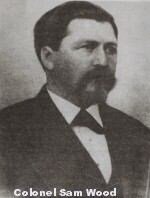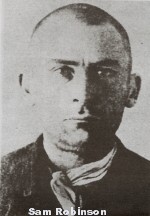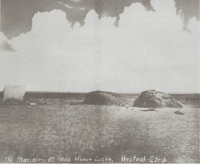By 1885, several hardy families had taken land in this plain, semi-arid region, and many of them desired to organize the area into a county. Some of these early settlers had previously known each other when they resided in the vicinity of McPhearson, Kansas. These former acquaintances became the core of the initial group to promote county status. The Cook brothers, C. E. and Orin, were the leaders of these enthusiastic citizens and the Cooks had established a small town in the midst of their claims, which they called Hugoton. At the time that these friends from McPhearson started the campaign to be designated as a county, Hugoton was the only town in the area and it was assumed that the little settlement would become the county seat.
While the Cook brothers and their followers were maneuvering (including taking a census) to get Stevens authorized as a county and Hugoton named as the county seat, another faction of settlers began a competitive course. Samuel "Sam" N. Wood and I. C. Price of Meade, Kansas, started another town, Woodsdale, eight miles NE of Hugoton. Wood and Price aspired that their new town could overtake Hugoton, and they could get it named as the county seat. A third village "Vorhees" emerged south of Hugoton, but it was never considered to be a contender for the county seat.
 To overcome the edge that Hugoton held (from it's
earlier inception),
the founders of Woodsdale offered "free city lots" to anyone who would
build immediately. This enticement started a boom in Woodsdale and
prompted a very heated contest between the two towns to be selected as
the county seat. However; when Stevens County was established in 1886,
Hugoton was named "the interim county seat."
To overcome the edge that Hugoton held (from it's
earlier inception),
the founders of Woodsdale offered "free city lots" to anyone who would
build immediately. This enticement started a boom in Woodsdale and
prompted a very heated contest between the two towns to be selected as
the county seat. However; when Stevens County was established in 1886,
Hugoton was named "the interim county seat."Following that announcement, conflict between the two towns escalated, as each sought to become "the permanent county seat". Sam Wood had served as a Colonel in a Kansas Regiment during the Civil War and later he was still being referred to, by that title. In the spring of 1887, while Colonel Wood and I.C. Price were traveling to Topeka, to file a protest over the census figures that had been submitted for the county, they were taken-into-custody by a group of men from Hugoton.
The two prisoners were brought back to the interim Stevens county seat and placed on trial. Wood and Price were found "guilty" and they were sentenced to accompany the posse on a buffalo hunt into "No Man's Land" (a track of more than 5000 square miles of land that lay just south of Stevens County which was not assigned to any state or territory. The area is presently known as the Oklahoma panhandle).
The sentences imposed on the Woodsdale men appeared to be strange and the purpose of the hunt raised suspicions, as there had been no buffalo herds found in that area in recent years. When the Woodsdale people became aware that their two leading citizens had been taken under those pretenses, they assumed that Wood and Price were destined to become victims of an intentional hunting accident.
S. O. Aubrey, a veteran Indian scout, took charge of the twenty-four Woodsdale men that volunteered to go into No Man's Land (AKA The Neutral Strip) and rescue Wood and Price. Aubrey and his men not only succeeded in recovering their leaders, but they forced the Hugoton men to accompany them to Garden City, Kansas. At Garden City, Aubrey had the Hugoton party charged with kidnapping. Those charges were later transferred to the new Stevens County and the trial was scheduled to be held in a Hugoton church, which also served as the first county courthouse. The trial was held in the fall of 1887. As expected, those tried (all were from Hugoton) were found "not guilty."
One of the main leaders in Hugoton during that period was a Sam Robinson, who was reported to be an experienced troublemaker from Kentucky. He had previously been attracted to Woodsdale because of the offer of "free city lots" and he had built a hotel. Robinson had hopes to become the Stevens County Sheriff but when Sam Wood refused to endorse him for that position, he become irate at the founder and his town. Robinson sold his hotel and moved to Hugoton. Colonel Wood and Woodsdale strongly supported J. M. Cross for County Sheriff, and he was elected. Cross maintained his County Sheriff's Office in Woodsdale, in defiance of Hugoton having been named the interim county seat.
Sam Robinson's animosity toward Woodsdale immediately made him a popular figure in Hugoton and he was elected to be the City Marshal of the county seat. The intense bitterness that had been displayed in the county sheriff's race had set the stage for further troubles to develop between these two officers of the law.
Early in 1888, Stevens County issued bonds to attract railroad development in the area. Robinson was accused of over-stepping his authority in processing the county certificates, and a warrant was issued for his arrest. When Sheriff Cross (along with others including Ed Short, City Marshal of Woodsdale) attempted to serve that warrant in Hugoton, some shots were fired. Several of Robinson's supporters joined him in defiance of the order, their interference prevented his arrest. After this foiled attempt to arrest their city marshal, the citizens of Hugoton prepared for an assault on their town. They dug trenches and erected barricades at the approaches where they expected the Woodsdale men to attack. Anxiety ran high as each side anticipated a showdown, but no further attempt was made to arrest Robinson, for some time.
 In July 1888, it was learned that Robinson, with his
family and some
friends, had gone into "The Neutral Strip" for an extended trip to
camp-out, fish and pick wild plums. Woodsdale City Marshal Ed Short was
selected to lead a posse and arrest Robinson in that locale, while he
was without the alliance of his Hugoton supporters. When Short and his
posse located the picnicking party, Robinson was not with the others.
Ed Short then sent word back to Woodsdale that he would continue the
search for Robinson, but needed more men.
In July 1888, it was learned that Robinson, with his
family and some
friends, had gone into "The Neutral Strip" for an extended trip to
camp-out, fish and pick wild plums. Woodsdale City Marshal Ed Short was
selected to lead a posse and arrest Robinson in that locale, while he
was without the alliance of his Hugoton supporters. When Short and his
posse located the picnicking party, Robinson was not with the others.
Ed Short then sent word back to Woodsdale that he would continue the
search for Robinson, but needed more men.Robinson had become aware of Short's approaching posse and to preclude an inevitable gunfight in which women and children would be in danger, he had decided to leave his family with their friends where they had set-up camp on Goff Creek. He headed for Hugoton and was making good time, because he was aware that Short and his men were "on his trail".
Upon receiving the message from Ed Short, Stevens County Sheriff Cross recruited Ted Eaton, Bob Hubbard, Roland Wilcox, and Herbert Tonney (1) to assist him. The Sheriff and the four young men departed Woodsdale to join City Marshal Short and his posse in their quest to locate and arrest Robinson. Sheriff Cross and his men traveled south to Reed's camp on Goff Creek, from where Short had sent his dispatch requesting assistance. When Cross and his men arrived, Reed told them that Short had departed and had left word with him to advise the posse to return to Woodsdale.
As Robinson (being trailed by Ed Short and his squad) neared the Stevens County Seat, he met a band of Hugoton men who were headed south to locate and help their city marshal, after learning that Short and posse had been sent from Woodsdale to arrest him. Shortly after Robinson met this group of supporters, they took-chase after Short and his posse. During the ensuing running gun-battle in which no one was injured, the Hugoton posse chased Short and his men back to Woodsdale, where the shooting ceased and the chase ended.
Some of the Hugoton men were aware that Sheriff Cross had left Woodsdale and was leading a posse into "No Man's Land" to join Short and his men. With Robinson now leading the posse that had just chased Ed Short and his men back to Woodsdale (a rather cowardly appearing retreat) the Hugoton squad quickly decided to proceed south and try to locate Sheriff Cross's posse and attack them while they were outside of Stevens County. Some of the men in the Hugoton posse obtained fresh mounts for the journey but others continued-on, riding their somewhat jaded horses.
After Sheriff Cross and his posse had rested a while at Reed's camp, they started the return trip to Woodsdale. In the evening, they came upon a haying crew, consisting of A. B. Haas, his two sons, and a friend named Dave Scott.
Haas and his men were gathering hay and had set-up-camp at a site that was locally known as "Wild Horse Lake" (reported to be 12 miles west of present Hooker, OK.) The name had originated from the wild horses that had previously roamed the area and the water that gathered in the low-lying site each year in the spring, during the rainy season. As the typical summer would progress, the so-called lake would dry-up, leaving the locale covered with lush grass that grew from the well-watered sod. The site that had been known as "Wild Horse Lake" in the spring and early summer became commonly refereed to as "the hay meadow" as they reaped the hay during the hot dry summer months. The Cross posse decided to spend the night in camp with the Haas haying crew and they would continue their return trip to Woodsdale, come morning.
Not long after Cross and his men had settled-in for the night, Robinson and his band of men arrived at the Haas camp and abruptly awakened the lot. The Cross posse had not expected any trouble during the night and only one or two of the men were able to reach a gun, but seeing that they were outnumbered they did not fire. All weapons were taken from Sheriff Cross and his men, as they were brought-fourth and assembled before Sam Robinson. The Hugoton City Marshal and his posse held the five disarmed men from Woodsdale at gunpoint, near two of the haystacks in the meadow.
It is reported that as Robinson slowly raised his rifle he said, "Sheriff Cross, you are my first man" and coldly pulled the trigger. After killing the Sheriff, Robinson and his men fired their guns point-blank into each of the unarmed Woodsdale posse. Hubbard was the second of the men to be executed, then Tonney, followed by Eaton and Wilcox. After the men had been gunned-down, matches were lit and held to their faces to confirm their death. Some of the victims were shot a second time. When confident that all of the Woodsdale men were dead, Robinson and his posse escorted the Haas haying crew away, leaving only the bodies of Sheriff Cross and his four men as they fell.
Tonney had been shot through the neck but was still alive. He had feigned death so well that he had not been shot again. After he was confident that all had left, he began to move about and check his companions, but found no sign of life. Tonney slowly made his way to his staked horse and with great effort he mounted the animal.
After ridding a few miles, the wounded man came upon an old "buffalo wallow". His desperate condition prompted him to dismount and lie-down in the muck. A few minutes in the sludge renewed his hope to survive. Tonney got back on his horse and continued riding North.
Shortly after daylight (the next morning), the wounded man met a rider on the trail. The man was Herman Cann, a constable from Vorhees, Kansas. Cann had been advised by Mr. Haas about the killings and he was on his way to "the hay meadow" to check-it-out. Cann delivered Tonney to a local doctor, who tended the wounded man. The next day he was taken by wagon back home to Woodsdale and in time, nineteen-year-old Herbert Tonney recovered.
The bodies of the four slain men were brought back to Woodsdale and returned to their families. The "Stevens County Seat War" had reached its' climax about 11:30 PM July 25, 1888, in a hay meadow, beyond the boundaries of Kansas.
